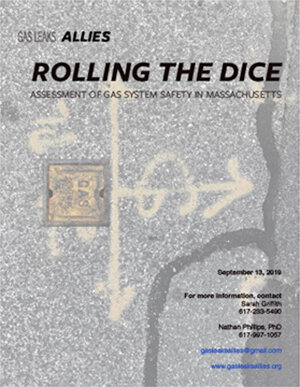
SAFETY
Massachusetts is rolling the dice every day.
Even though the gas distribution system in Massachusetts is largely buried underground, the dangers of relying on gas are all around us.
For many, memories of gas explosions and fires fade into the past. Single incidents, while they happen regularly, aren’t connected in media reports.
Utilities aren’t required to report incidents or analyze why they happened.
Even community-wide disasters like the collapse of the gas system in the Merrimack Valley can slip from public attention.
Public safety, health, and climate are all at risk from leaking gas and the impacts of methane. Meanwhile, money from both ratepayers and shareholders is being wasted by investing in a dangerous system.
Despite the magnitude of the problem, we can solve it.
GAS SAFETY REPORT
Rolling the Dice: Assessment of Gas System Safety in Massachusetts presents documented incidents and publicly available facts about the gas distribution system that add up to an urgent message to legislators, the executive branch, municipalities, and gas companies to take action now.
Immediate and short-term improvements can greatly enhance public safety.
At the same time, Massachusetts can accelerate measures to transition away from gas to safer, healthier, affordable renewable energy for all.
Now You Know—
Here’s What You Can Do
Concerned organizations and community members can use the information below to advocate for fixing the worst gas leaks while transitioning to safer energy for everyone.
Distribute this one-page summary of the report.
Share the executive summary in Spanish or in English.
Urge adoption of the report’s Triage and Transition Recommendations.
Read and share Another Gas Scare about the gas incident in the Merrimack Valley just one year after the 2018 gas disaster.
Repost What I Learned from the Merrimack Valley Gas Disaster.
Download and send a Letter to the Editor.
“Relying on gas for our energy is not safe, but we need to keep heating our homes and businesses without going back to whale oil. The good news is that cost-effective alternatives are available now.”
Background Information Supporting the Report
2018 Gas Distribution System Description
Current Gas Safety Legislation
Gas Safety, Inc. has started mapping gas incidents from the past 100 years.
State-Commissioned Gas Safety Assessment
After the Merrimack Valley gas explosions in 2018, Governor Baker ordered an investigation into the safety of the Massachusetts gas distribution system and gas company operations.
The Commonwealth contracted with Dynamic Risk to provide a “comprehensive and technical safety review resulting in recommendations for improvement.” The Gas Transition Allies participated in the stakeholder process and analyzed the final report in detail.
The Dynamic Risk report calls out troubling problems with safety and the safety culture at Massachusetts gas utilities, but lacks concrete, measurable recommendations to ensure public safety.
Review of Dynamic Risk Phase One Report by Gas Transition Allies safety experts
Natural Gas Experts Challenge Baker Administration on Safety
Gas Transition Allies respond to Dynamic Risk’s assessment of gas safety in Massachusetts
Statewide Assessment of Gas Pipeline Safety Phase II Report by Dynamic Risk
Note that the Gas Transition Allies did not contribute to this report. We are posting it here to make it easily available to the public.
National Safety Report: Methane Gas Leaks
Findings in the 2022 report Methane Gas Leaks, produced by US PIRG, confirm the Gas Transition Allies Rolling the Dice report from 2019, showing that the risks we found in Massachusetts are true nationwide.
"With growing awareness of the impact of methane leaks on the climate, and with growing availability of safer alternatives, it is clear that gas has no place in a modern clean energy network."
A gas pipeline incident serious enough to cause death or dismemberment or extensive property damage occurs somewhere in the U.S. approximately every 40 hours.
Major gas leak incidents have not declined significantly since 2010.
The amount of leaked gas measured in the atmosphere by scientists is five times greater than the EPA estimates.
“Instead of speeding up replacement of the gas system, as Dynamic Risk currently recommends, we urgently need to change course. Doubling down on what caused the Merrimack Valley explosions in the first place is not the solution. We need to protect our homes and neighborhoods now as we move quickly to safer, healthier, renewable energy.”



